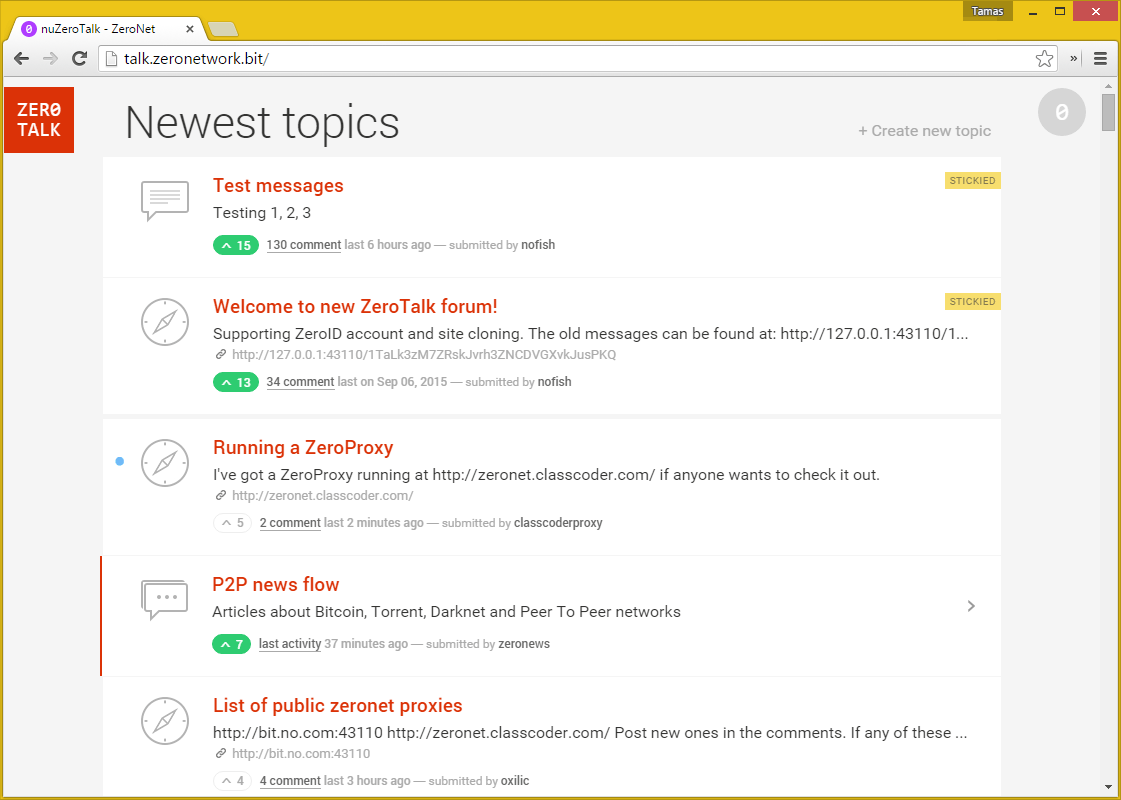Decentralized websites using Bitcoin crypto and the BitTorrent network - https://zeronet.io
- We believe in open, free, and uncensored network and communication.
- No single point of failure: Site remains online so long as at least 1 peer is serving it.
- No hosting costs: Sites are served by visitors.
- Impossible to shut down: It's nowhere because it's everywhere.
- Fast and works offline: You can access the site even if Internet is unavailable.
- Real-time updated sites
- Namecoin .bit domains support
- Easy to setup: unpack & run
- Clone websites in one click
- Password-less BIP32 based authorization: Your account is protected by the same cryptography as your Bitcoin wallet
- Built-in SQL server with P2P data synchronization: Allows easier site development and faster page load times
- Anonymity: Full Tor network support with .onion hidden services instead of IPv4 addresses
- TLS encrypted connections
- Automatic uPnP port opening
- Plugin for multiuser (openproxy) support
- Works with any browser/OS
- After starting
zeronet.pyyou will be able to visit zeronet sites usinghttp://127.0.0.1:43110/{zeronet_address}(eg.http://127.0.0.1:43110/1HeLLo4uzjaLetFx6NH3PMwFP3qbRbTf3D). - When you visit a new zeronet site, it tries to find peers using the BitTorrent network so it can download the site files (html, css, js...) from them.
- Each visited site is also served by you.
- Every site contains a
content.jsonfile which holds all other files in a sha512 hash and a signature generated using the site's private key. - If the site owner (who has the private key for the site address) modifies the
site, then he/she signs the new
content.jsonand publishes it to the peers. Afterwards, the peers verify thecontent.jsonintegrity (using the signature), they download the modified files and publish the new content to other peers.
- Download ZeroBundle package:
- Unpack anywhere
- Run
ZeroNet.exe(win),ZeroNet(.app)(osx),ZeroNet.sh(linux)
wget https://github.com/HelloZeroNet/ZeroBundle/raw/master/dist/ZeroBundle-linux64.tar.gztar xvpfz ZeroBundle-linux64.tar.gzcd ZeroBundle- Start with
./ZeroNet.sh
It downloads the latest version of ZeroNet then starts it automatically.
sudo apt-get updatesudo apt-get install msgpack-python python-geventwget https://github.com/HelloZeroNet/ZeroNet/archive/master.tar.gztar xvpfz master.tar.gzcd ZeroNet-master- Start with
python zeronet.py - Open http://127.0.0.1:43110/ in your browser
git clone https://aur.archlinux.org/zeronet.gitcd zeronet-gitmakepkg -srcisystemctl start zeronet- Open http://127.0.0.1:43110/ in your browser
See ArchWiki's ZeroNet article for further assistance.
layman -a raiagentecho '>=net-vpn/zeronet-0.5.4' >> /etc/portage/package.accept_keywords- (Optional) Enable Tor support:
echo 'net-vpn/zeronet tor' >> /etc/portage/package.use emerge zeronetrc-service zeronet start- Open http://127.0.0.1:43110/ in your browser
See /usr/share/doc/zeronet-*/README.gentoo.bz2 for further assistance.
pkg install zeronetorcd /usr/ports/security/zeronet/ && make install cleansysrc zeronet_enable="YES"service zeronet start- Open http://127.0.0.1:43110/ in your browser
vagrant up- Access VM with
vagrant ssh cd /vagrant- Run
python zeronet.py --ui_ip 0.0.0.0 - Open http://127.0.0.1:43110/ in your browser
docker run -d -v <local_data_folder>:/root/data -p 15441:15441 -p 127.0.0.1:43110:43110 nofish/zeronet- This Docker image includes the Tor proxy, which is disabled by default. Beware that some
hosting providers may not allow you running Tor in their servers. If you want to enable it,
set
ENABLE_TORenvironment variable totrue(Default:false). E.g.:
docker run -d -e "ENABLE_TOR=true" -v <local_data_folder>:/root/data -p 15441:15441 -p 127.0.0.1:43110:43110 nofish/zeronet
- Open http://127.0.0.1:43110/ in your browser
virtualenv envsource env/bin/activatepip install msgpack-python geventpython zeronet.py- Open http://127.0.0.1:43110/ in your browser
- No torrent-like file splitting for big file support
No more anonymous than Bittorrent(built-in full Tor support added)- File transactions are not compressed
or encrypted yet(TLS encryption added) - No private sites
Shut down zeronet if you are running it already
$ zeronet.py siteCreate
...
- Site private key: 23DKQpzxhbVBrAtvLEc2uvk7DZweh4qL3fn3jpM3LgHDczMK2TtYUq
- Site address: 13DNDkMUExRf9Xa9ogwPKqp7zyHFEqbhC2
...
- Site created!
$ zeronet.py
...Congratulations, you're finished! Now anyone can access your site using
http://localhost:43110/13DNDkMUExRf9Xa9ogwPKqp7zyHFEqbhC2
Next steps: ZeroNet Developer Documentation
- Modify files located in data/13DNDkMUExRf9Xa9ogwPKqp7zyHFEqbhC2 directory. After you're finished:
$ zeronet.py siteSign 13DNDkMUExRf9Xa9ogwPKqp7zyHFEqbhC2
- Signing site: 13DNDkMUExRf9Xa9ogwPKqp7zyHFEqbhC2...
Private key (input hidden):- Enter the private key you got when you created the site, then:
$ zeronet.py sitePublish 13DNDkMUExRf9Xa9ogwPKqp7zyHFEqbhC2
...
Site:13DNDk..bhC2 Publishing to 3/10 peers...
Site:13DNDk..bhC2 Successfuly published to 3 peers
- Serving files....- That's it! You've successfully signed and published your modifications.
- Bitcoin: 1QDhxQ6PraUZa21ET5fYUCPgdrwBomnFgX
- Paypal: https://zeronet.readthedocs.org/en/latest/help_zeronet/donate/
- Gratipay: https://gratipay.com/zeronet/
- Better OSX/Safari compatibility made possible by BrowserStack.com
- More info, help, changelog, zeronet sites: https://www.reddit.com/r/zeronet/
- Come, chat with us: #zeronet @ FreeNode or on gitter
- Email: hello@zeronet.io (PGP: CB9613AE)



